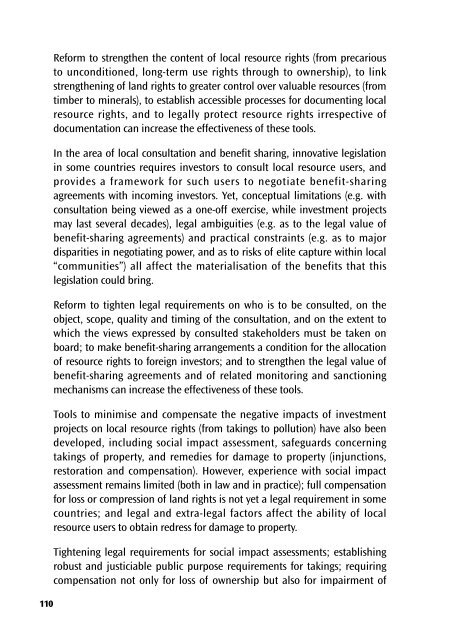Legal empowerment for local resource control
Legal empowerment for local resource control
Legal empowerment for local resource control
You also want an ePaper? Increase the reach of your titles
YUMPU automatically turns print PDFs into web optimized ePapers that Google loves.
110<br />
Re<strong>for</strong>m to strengthen the content of <strong>local</strong> <strong>resource</strong> rights (from precarious<br />
to unconditioned, long-term use rights through to ownership), to link<br />
strengthening of land rights to greater <strong>control</strong> over valuable <strong>resource</strong>s (from<br />
timber to minerals), to establish accessible processes <strong>for</strong> documenting <strong>local</strong><br />
<strong>resource</strong> rights, and to legally protect <strong>resource</strong> rights irrespective of<br />
documentation can increase the effectiveness of these tools.<br />
In the area of <strong>local</strong> consultation and benefit sharing, innovative legislation<br />
in some countries requires investors to consult <strong>local</strong> <strong>resource</strong> users, and<br />
provides a framework <strong>for</strong> such users to negotiate benefit-sharing<br />
agreements with incoming investors. Yet, conceptual limitations (e.g. with<br />
consultation being viewed as a one-off exercise, while investment projects<br />
may last several decades), legal ambiguities (e.g. as to the legal value of<br />
benefit-sharing agreements) and practical constraints (e.g. as to major<br />
disparities in negotiating power, and as to risks of elite capture within <strong>local</strong><br />
“communities”) all affect the materialisation of the benefits that this<br />
legislation could bring.<br />
Re<strong>for</strong>m to tighten legal requirements on who is to be consulted, on the<br />
object, scope, quality and timing of the consultation, and on the extent to<br />
which the views expressed by consulted stakeholders must be taken on<br />
board; to make benefit-sharing arrangements a condition <strong>for</strong> the allocation<br />
of <strong>resource</strong> rights to <strong>for</strong>eign investors; and to strengthen the legal value of<br />
benefit-sharing agreements and of related monitoring and sanctioning<br />
mechanisms can increase the effectiveness of these tools.<br />
Tools to minimise and compensate the negative impacts of investment<br />
projects on <strong>local</strong> <strong>resource</strong> rights (from takings to pollution) have also been<br />
developed, including social impact assessment, safeguards concerning<br />
takings of property, and remedies <strong>for</strong> damage to property (injunctions,<br />
restoration and compensation). However, experience with social impact<br />
assessment remains limited (both in law and in practice); full compensation<br />
<strong>for</strong> loss or compression of land rights is not yet a legal requirement in some<br />
countries; and legal and extra-legal factors affect the ability of <strong>local</strong><br />
<strong>resource</strong> users to obtain redress <strong>for</strong> damage to property.<br />
Tightening legal requirements <strong>for</strong> social impact assessments; establishing<br />
robust and justiciable public purpose requirements <strong>for</strong> takings; requiring<br />
compensation not only <strong>for</strong> loss of ownership but also <strong>for</strong> impairment of

















